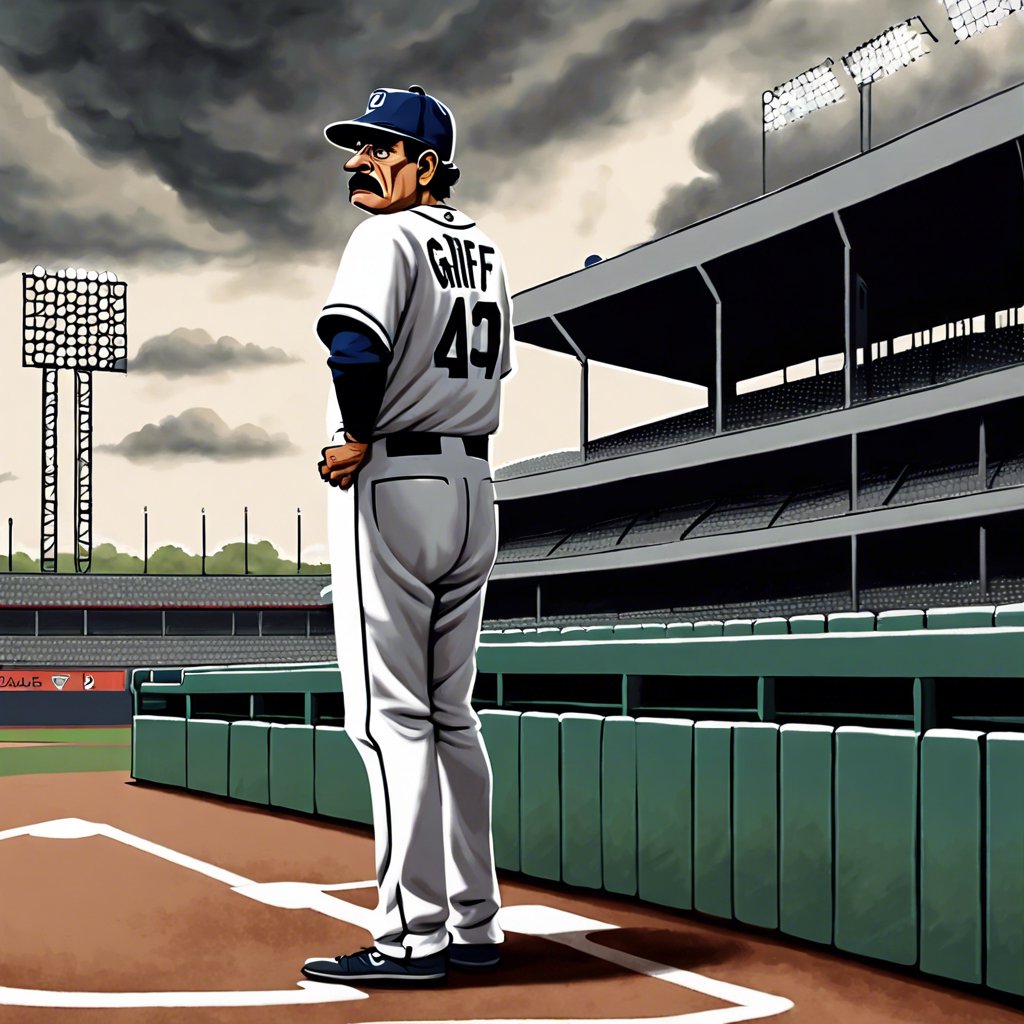Pedro Grifol’s Tenure with the White Sox Comes to an End
Editor’s note: The Chicago White Sox have officially parted ways with manager Pedro Grifol, as announced on Thursday morning.
OAKLAND, Calif. — Just two hours before the game, Chicago White Sox manager Pedro Grifol found himself in his office this week, preparing for yet another match against the Oakland Athletics. Clad in his uniform, he exuded a sense of calm that contrasted sharply with the turmoil surrounding his team.
When Grifol was hired in November 2022, he brought an intensity characteristic of a seasoned baseball lifer. “We’re going to prepare every night to kick your ass, and that’s just what we’re gonna do,” he famously declared—words that have since become emblematic of the White Sox’s struggles, as they have delivered far too few “ass-kickings” during his tenure. In his second year at the helm, Grifol’s record stands at a dismal 89-190. On this particular day, the team was mired in a 20-game losing streak, and the questions about his job performance were relentless.
As a result, the discourse surrounding his position has shifted from speculation to inevitability. Seated comfortably in his chair, Grifol introduced himself and engaged in a thoughtful discussion, acknowledging the urgent desire to secure a victory. When confronted with a radio report suggesting he had blamed his players for the team’s woes—an apparent motivational tactic gone awry—his denial underscored the responsibilities of leadership. “What coach or manager in their right mind would try to separate themselves from adversity?” Grifol responded. “When you’re in a group setting, when you’re all in this thing together… It’s not my personality, it’s not who I am.”
However, the conversation took a sharper turn when Grifol was asked whether he believed the team’s talent was superior to their record. “I’m not going to answer that question. What’s behind that question?” he retorted, displaying a hint of defensiveness. When asked if he felt the media’s portrayal of his team was unfair, he replied, “I don’t read the media. I don’t have social media. So that’s a tough question. I know where we’re at as a team. I know where we’re trying to go, and what we’re trying to get accomplished. But as far as what’s happening out there, I can just imagine it.”
Hours later, the White Sox would tie an American League record with their 21st consecutive loss. Though they managed to break the streak the following day, it was merely a fleeting moment of relief. By Wednesday, the team departed Oakland following yet another defeat, a 3-2 setback that left them a staggering 61 games below .500—15 games worse than any other team in Major League Baseball.
As the season approached its conclusion, the White Sox found themselves on a path that could lead to one of baseball’s most infamous records. In 1962, the New York Mets achieved a feat that had never been seen in the modern era of baseball: losing a staggering 120 games in a single season. The 2024 White Sox are on pace to eclipse that mark, with the potential to lose 123 games. To avoid sharing that dubious distinction, they would need to win at least 15 of their remaining 45 games—a tall order given their current form.
The remainder of the season has become a desperate attempt to evade infamy, transforming into a topic of national conversation, even as the beleaguered manager seems taken aback by the scrutiny. “This is a close-knit group,” Grifol said. “Here, you come from the outside, and nobody knows you.”
In 2023, the White Sox were expected to be competitive, but their dismal record prompted a trade deadline sell-off. A year later, a team that began the season with low expectations has somehow found a way to underperform even further, with a roster filled with hitters who have failed to live up to their previous performance standards. Luis Robert Jr. hit 38 home runs last season; this year, he has managed just 12. Similarly, Andrew Benintendi, an All-Star two years prior, has struggled with an OPS+ of 70 this season.
Other players, including Andrew Vaughn, Gavin Sheets, Nick Senzel, and the recently traded Eloy Jimenez, have also underperformed. In contrast, Robbie Grossman and Kevin Pillar, who struggled earlier with the White Sox, have since flourished with their new teams.
This troubling trend raises essential questions: Where is this franchise heading, and what plans are in place to rectify the situation? White Sox general manager Chris Getz, a 40-year-old former player, was elevated to his position late last season following the dismissal of longtime executives Kenny Williams and Rick Hahn. He has emphasized the goal of returning to contention, describing this season as the first phase of a “multi-layered, multi-year project,” while boasting about what he sees as growth within the organization’s pitching department.
“We made a pretty strong run at the major-league level with some of our starting pitchers—being at the top of the American League for two months,” Getz said in a recent interview. “That is not something I think many people believed we were going to be able to accomplish.”
While there was indeed a period during which the starting pitching performed admirably, as a whole, the staff has fallen short of expectations. The White Sox currently hold a team ERA of 4.83, better than only the Colorado Rockies.
This season has proven more painful than anyone anticipated, a sentiment Getz acknowledges. “I know it’s hard to watch,” he admitted. As an unproven GM, his previous tenure as the club’s director of player development had yielded limited success. However, he believes that the organization is now better positioned than when he took over. “At the end of the day, nobody’s going to feel or believe that we’re building toward something until it shows up in the win-loss record,” Getz stated. “That’s the reality of our sport. That’s the reality of fan bases. Until that happens, there’s going to be a high level of skepticism.”
Many fans questioning the rebuild’s credibility also remain skeptical about whether owner Jerry Reinsdorf will invest adequately to transform the White Sox into a sustainable winner. After all, the most lucrative contract in White Sox history belongs to Andrew Benintendi, who signed for $75 million before last season. When asked whether Reinsdorf would eventually increase his financial commitment, Getz responded affirmatively: “Yes.”
“There’s going to be times when we’re going to have to tap into some financial resources to go after free agents or invest in infrastructure and technology to continue strengthening our front office and departments throughout the organization,” Getz elaborated. “That’s all part of this plan that’s in place.”
Yet, envisioning that plan becomes increasingly challenging as disheartening losses continue to accumulate. Nonetheless, the White Sox clubhouse has largely maintained an appearance of normalcy. Players engaged in card games or scrolled through their phones before the game, and the mood remained light. Even the silence following Monday’s game felt typical for a big league team. Regardless of whether a team is contending for a championship or embroiled in a historic losing streak, silence prevails.
The most apparent difference in this clubhouse is that players are now tasked with explaining the seemingly inexplicable. “We’re handling it fine, as best we can,” outfielder Corey Julks said quietly. “We’ve got to rally as a team.”
The trade deadline offered little solace to those hoping to see tangible progress in Chicago’s plan. The White Sox faced widespread criticism for their return in a three-team trade that netted Miguel Vargas and two 19-year-old prospects in exchange for Erik Fedde, Tommy Pham, and Michael Kopech. Getz acknowledged that he anticipated potential backlash regarding the trade but expressed satisfaction with the outcome, viewing it as a pivotal organizational shift. “Obviously, that’s why I’m here,” Vargas said. “I’m trying to bring that LA energy, trying to bring that here. Have that culture… trying to bring that energy to be able to, in the future, have success.”
Vargas transitioned from a first-place team to one that was, at the time, enduring a 15-game losing streak.
In the days that followed, the burden of discussing the team’s struggles weighed heavily on the players. “We just haven’t scored as many runs as the other team has for 20 games in a row,” pitcher Garrett Crochet remarked before a game this week. When asked—likely not for the first time—about the anxiety of avoiding an all-time loss record, he replied curtly, “I’m done with this interview.”
John Brebbia, a 34-year-old reliever in his first season with the White Sox, is the oldest and most experienced player on the roster. He believes that the team’s talent exceeds its record, acknowledging the legitimate concerns about potentially finishing with a worse record than the ‘62 Mets. “It’s fair, it should be asked,” Brebbia said. “If it’s trending that way, we’re gonna get asked about it. It’s part of the job. I can’t speak for everyone’s motivation. But from my perspective, it looks like everyone shows up and wants to win as much as possible.”
However, beyond the field, the White Sox have become a spectacle. Even the team’s own postgame show has taken aim at the organization’s missteps. Before Grifol’s hiring, Ozzie Guillen was reportedly among several candidates interviewed. His deep-rooted ties to the White Sox as both a player and manager during the team’s 2005 World Series championship make his perspective particularly salient. Now serving as an analyst, Guillen recently quipped on air after a loss, “I don’t think I was that bad a manager.”
Fans have also reached their limit. Paper bags have become a common accessory for some loyal White Sox supporters still attending games. In Oakland, one dedicated fan, Matt Verplaetse, purchased a ticket and sat alone in the stands behind the visiting dugout, sporting a T-shirt emblazoned with a familiar plea from the fanbase: “Sell the team Jerry.”
Having grown up in the Chicago area and now residing in Northern California, Verplaetse remains a die-hard fan, though he has enough self-awareness to laugh at the absurdity of his situation. The future of the franchise looms large on the horizon, with questions swirling about the validity of their long-term strategy and the caliber of staff and players they can attract. Yet for now, as the team embarks on its final 45 games, Verplaetse has narrowed his focus to one pressing question: “I think everyone, going in, expected it to be pretty bad, but (they) never predicted it being this bad. And now, it’s almost a morbid curiosity. How bad is it going to get?”
(Illustration: Dan Goldfarb / The Athletic. Photos: Getty Images / David Berding, Lachlan Cunningham)











